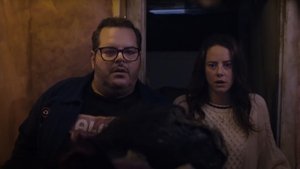
Video Sources 35 Views Report Error
Synopsis
The lives of two siblings are completely upended when they discover a dead body, long buried in their parent’s basement, sending them down a rabbit hole of crime and murder.

Quick Movie Info
Adulthood is an edgy British drama film that was made available in 2008 as an update to Kidulthood. Directed and written by Noel Clarke, it continues the unadulterated exploration of the culture of youth within West London. The story begins six years following the incident in Kidulthood with a focus on revenge, redemption, and the brutal realities living in a hostile setting.
Summary of Plot
It tells the story of Sam Peel, recently released from prison after having served six years in prison for murdering Trevor. As he tries to make a change in the rest of his life Sam remains haunted and resentful of the past, as Trevor’s younger brother as well as his old friends are determined to get revenge. In the course of a single morning, Sam struggles to prove that he’s changed as he confronts the cycle of crime and violence that has surrounded him. The story highlights the tension between wanting to be a hero and being pulled back to the streets that he controlled.
Themes and Analyses
The principal themes are the effects of violence on redemption cycle of revenge along with the struggle of young people who are transitioning to adulthood. The film focuses on systemic gender inequality, toxic masculinity and the lack of opportunities for marginalized communities. The film also considers the difficulties of escaping from a past that was violent, in a society that offers no chance to re-enter the game. Analytically speaking, adulthood is not portrayed as freedom, but rather as responsibility in the form of accountability, responsibility, and importance of the actions one takes.

Criticism and Controversy
Adulthood received both praise and criticism. Many praised its honest depiction of inner-city struggle and its honest portrayal, while some criticized the film for glorifying crime and violence. The film’s use explicit drugs, language and violence provoked debate over the impact it had on the youth culture. Noel Clarke himself was both recognized as a vocalist with a strong voice in British cinema, but also criticized for perpetuating stereotypes about Black British youth.
Cinematography and Style
The film is shot in an unrefined handheld camera style to increase realism. It also features dark, sombre colors reflecting the dark urban surroundings. The pace is quick and fast, reflecting the intensity of Sam’s single-day journey. The soundtrack, which consists comprised of UK hip-hop and grime enhances the street-culture aesthetic which makes the film seem true to the place it is set in.
Cultural Impact
Adulthood established its status as an iconic film in British cinema, specifically in urban drama. It captivated young viewers who seldom saw their lives being portrayed on film. It also influenced wider discussions about the violence of gangs, crime and the process of redemption. The film also influenced the future of British urban dramas and heightened the stigma of grime in mainstream films.
Where to watch
Adulthood is available on a variety of streaming platforms across the UK and across the world, including Amazon Prime Video and digital rental services. Its availability may vary depending on the region.
Africa blood and Guts?
There isn’t any connection between adulthood as well as “Africa Blood and Guts.” The second is an independent documentary.
Frequently asked questions
Q1. What is Adulthood an actual event?
It is not, as it is a fiction story, but the story is inspired by real-life urban struggles.
Q2. Do I have to watch Kidulthood first?
Absolutely watching Kidulthood can provide important background for the events of Adulthood.
Q3. What was the director of this film?
Noel Clarke, who also wrote and played the lead role as a character in the movie.
Q4. What is the genre of Adulthood?
It’s an British Urban Crime Drama.
Q5. Are there any sequels?
The trilogy ends by releasing Brotherhood (2016).
Q6. What was the reason Adulthood controversial?
It was because of its graphic content, raunchy language, and depiction of gang life. many believed glorified crime.
Conclusion
Adulthood is a raw and strong continuation of Kidulthood depicting the struggles of renouncing a brutal past and navigating the consequences of one’s choices. The gritty realism of the film, its emotional resonance, and themes that focus on redemption makes it a major movie that is a landmark in British cinema. Despite the controversy, it is an iconic urban narrative and has sparked debate about youth culture, violence and second chances.
Original title Adulthood
Director
Director
Cast
Megan
Noah
Joe Coella
Lindsey
Diego
Officer Powell
T'Shawn




























